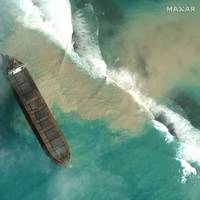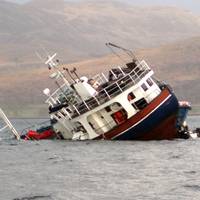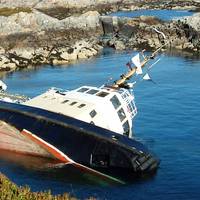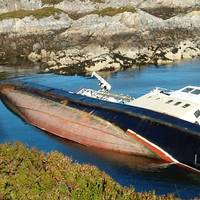Wakashio Spill Highlights Importance of Adopting Latest International Legal Instruments

The ongoing oil pollution incident from the grounded 203,000 DWT bulk carrier MV Wakashio is threatening an ecological catastrophe around the Indian Ocean island of Mauritius, endangering corals, fish and other marine life already under threat from climate change (IPCC 2018).In addition, it risks bringing devastating consequences for the economy, food security, health and tourism industry. Tourism in Mauritius - a popular destination for its pristine beaches - reportedly contributed about $1.6 billion to its economy during the last year…
Russia Assents to Passenger Compensation Treaty
The Russian Federation has acceded to the International Maritime Organization (IMO) treaty dealing with compulsory insurance covering passengers on ships.According to IMO, Yury Melenas, Permanent Representative of the Russian Federation to IMO, met IMO Secretary-General Kitack Lim to deposit the instrument of accession (16 January).The 2002 Athens Convention relating to the Carriage of Passengers and their Luggage by Sea sets the limits of liability for incidents on a ship involving passengers, including death of or personal injury to a passenger and loss of or damage to luggage and vehicles.The Convention was adopted at a Conference…
IMO Addresses Wreck Removal Challenges
A ship wreck can be a hazard to navigation. Other vessels and their crews can potentially be endangered, and, depending on the nature of the cargo and remaining fuel on board, a wreck may also cause damage to marine environments and other coastal interests. Then there is the issue of costs and risks involved in marking and removing hazardous wrecks.To help resolve these issues, International Maritime Organization (IMO)'s Nairobi Wreck Removal Convention, covers the legal basis for States to remove, or have removed, shipwrecks, drifting ships, objects from ships at sea, and floating offshore installations.To spread knowledge of the specific aspects of the Convention…
Nairobi Wreck Removal Convention Updated
Hazardous ship wrecks can cause many problems. Depending on its location, a wreck may be a hazard to navigation, potentially endangering other vessels and their crews. It may also cause substantial damage to the marine and coastal environments, depending on the nature of the cargo. On top of this, there is the issue of costs involved in marking and removing hazardous wrecks. International Maritime Organization (IMO)'s Nairobi Wreck Removal Convention goes some way to resolving these issues. It covers the legal basis for States to remove, or have removed, shipwrecks, drifting ships, objects from ships at sea, and floating offshore installations.
Myanmar Accedes to Treaty Covering Bunker Oil Pollution Damage
The International Maritime Organization (IMO) treaty ensuring that adequate compensation is available to persons that suffer damage caused by oil spills, when carried as fuel in ships’ bunkers, has been ratified by Myanmar. The International Convention on Civil Liability for Bunker Oil Pollution Damage (BUNKER) applies to damage caused on the territory, including the territorial sea, and in exclusive economic zones of States under the Convention. Under the Convention, the registered owner of a vessel is required to maintain compulsory insurance cover, and there is also the requirement for ‘direct action’ – which allows a claim for compensation for pollution damage to be brought directly against an insurer.
Wreck Removal Challenges
The issue of how to legally remove hazardous wrecks at sea has been in the spotlight at the Salvage & Wreck London 2017 Conference (7 December). International Maritime Organization (IMO)’s Jan De Boer took part in a panel discussing the challenges surrounding wreck removal and provided an update on the Nairobi Wreck Removal Convention. The Convention provides the legal basis for States to remove, or have removed, shipwrecks that may threaten the safety of lives, goods and property at sea, as well as the marine environment. It applies to shipwrecks, objects from ships at sea, drifting ships and floating offshore installations. Under the treaty, shipowners are strictly liable for costs of locating, marking and removing hazardous wrecks.
ICS & CMI Update Campaign on Maritime Treaty Ratification
The International Chamber of Shipping (ICS) – whose member national shipowner associations represent over 80% of the world merchant fleet, and the Comité Maritime International (CMI) – the international association for maritime lawyers, have released an updated brochure to promote the importance of governments ratifying international maritime conventions, especially those adopted by the UN IMO. The aim of the brochure ‘Promoting Maritime Treaty Ratification’ is to encourage more widespread ratification of some key maritime instruments that would benefit from a greater level of global acceptance. This includes a number of important instruments which have not yet received adequate ratifications from governments to enter into force globally.
How to Legally Remove a Hazardous Wreck
What is the legal basis for removing a hazardous wreck at sea? Who bears the liability? These and many other wreck removal questions were addressed by IMO’s Jan de Boer at the ACI’s Maritime Salvage & Casualty Response conference in London (13-14 September). Speaking to a wide variety of stakeholders (Participants from salvage companies, tug & towage companies, authorities, ship owners, ship managers, P&I clubs, maritime lawyers and consultants) concerned with wreck removal, Mr. de Boer gave an overview of IMO’s Nairobi International Convention on the Removal of Wrecks, which provides the legal basis for States to remove, or have removed, shipwrecks that may threaten the safety of lives, goods and property at sea, as well as the marine environment.
IMO Welcomes Financial Security Obligations for Seafarers
International Maritime Organization (IMO) Secretary-General Kitack Lim has welcomed the entry into force today (18 January) of new obligations under the Maritime Labour Convention (MLC 2006) which require shipowners to have compulsory insurance to cover abandonment of seafarers, as well as claims for death or long-term disability of seafarers. The 2014 amendments to the MLC 2006, which comes under the auspices of the International Labour Organization (ILO), are based on guidelines which were developed by a joint IMO/ILO working group, which reported to both IMO's Legal Committee and ILO's governing bodies. "These amendments, which will provide better protection for seafarers and their families…
Nairobi Wreck Removal Convention Explained
The International Maritime Organization (IMO) treaty covering wreck removal is on the agenda at the 7th Maritime Salvage and Casualty Response Conference in London (7-8 September). IMO’s Jan de Boer gave an insight into the Organization’s Nairobi Wreck Removal Convention, which provides the legal basis for States to remove, or have removed, shipwrecks that may threaten the safety of navigation, the marine environment as well as the coastline or related interests. The treaty also provides uniform international rules for the prompt and effective removal of wrecks located beyond territorial seas, and optional application of the rules in countries’ territories, including territorial seas.
Limitless Salvage

Whether driven by treasure hunting or environmental protection, the days of forgotten wrecks, even at great depths, is past. It seems like every month we see reports of long-lost maritime wrecks being discovered on the ocean bottom and treasures being salvaged from great depths. We also hear regularly of oil being recovered from sunken wrecks. There is now no practical limit to the ability to recover objects from the sea floor, regardless of depth, currents, weather, or other obstacles. The only existing obstacle seems to be financing - and costs are decreasing regularly.
Nairobi Wreck Removal Convention Enters into Force

The Nairobi International Convention on the Removal of Wrecks enters into force on Tuesday, April 14, 2015. The Convention places strict liability on owners for locating, marking and removing wrecks deemed to be a hazard and makes State certification of insurance, or other form of financial security for such liability, compulsory for ships of 300 gt and above. It also provides States Parties with a right of direct action against insurers. The Convention fills a gap in the existing…
Cook Islands to Issue Wreck Removal Certificates
The Cook Islands has acceded to the Nairobi International Convention on the Removal of Wrecks, 2007 (“The Nairobi Convention”). As a State Party, Cook Islands will issue Wreck Removal Certificates to its own ships and also to ships flying the flags of states that have not yet become party to the Nairobi Convention. The Nairobi Convention, which will come into force on 14 April 2015, requires all ships over 300 GT (including fishing vessels and commercial yachts) to have insurance in place to cover the location, marking and removal of a wreck; deemed to be a hazard in a State party’s Convention area. Glenn Armstrong, Managing Director of Maritime Cook Islands…
Cruise Ship Liability & Compensation Treaty Kicks In
The International Maritime Organization (IMO) informs that substantially increased limits of liability for the death of, or personal injury to, a passenger on a ship apply from 23, April 2014, according to the Athens Convention relating to the Carriage of Passengers and their Luggage by Sea, 2002. The 2002 Protocol to the Athens Convention relating to the Carriage of Passengers and their Luggage by Sea, 1974, (PAL), revises and updates the 1974 Convention, which established a regime of liability for damage suffered by passengers carried on a seagoing vessel. As a precondition for joining, Parties to the 2002 Protocol are required to denounce the 1974 treaty and its earlier Protocols.
Shipowners to Become Liable for Costs of Wreck Removal

Shipowner liability is on the horizon as the Nairobi International Convention on the Removal Wrecks will enter into force on 14 April 2015 following the deposit, on 14 April 2014, of an instrument of ratification by Denmark, with the International Maritime Organization (IMO). Among several provisions, the Convention will place financial responsibility for the removal of certain hazardous wrecks on shipowners, making insurance, or some other form of financial security, compulsory.
Wreck-Removal Convention to Enter into Force

The Nairobi International Convention on the Removal Wrecks will enter into force on April 14, 2015 following the deposit, on April 14, 2014, of an instrument of ratification by Denmark, with the International Maritime Organization (IMO). Among several provisions, the convention will place financial responsibility for the removal of certain hazardous wrecks on shipowners, making insurance, or some other form of financial security, compulsory. Denmark became the 10th country to ratify the convention, thereby triggering its entry into force exactly 12 months later.
Protocol Adopted to Athens Conventions
The IMO stated that the diplomatic conference that met in London adopted a protocol to the Athens Convention Relating to the Carriage of Passengers and their Luggage by Sea, 1974. The Protocol would, if ratified by at least 10 States, impose a compulsory insurance requirement on passenger ship operators and raise liability limits to 250,000 Special Drawing Rights about $325,000. The amendments to the Convention are contained in a Protocol to the Athens Convention. IMO Secretary General William A. O'Neil said that the 2002 Protocol, when it comes into force, would provide a much-needed update to the 1974 Convention and he urged Governments to ratify the Protocol as soon as possible.
China’s Oil Pollution Laws Worth Watching
The UK P&I Club offered the following briefing on Chinese marine pollution law. Ship owners and operators trading in Chinese waters face an extensive set of new legal and regulatory requirements governing their roles and responsibilities in oil pollution incidents. China’s Prevention and Control of Marine Pollution from Ships Regulation was implemented on 1st March 2010. It dovetails with the Marine Environment Protection Law of the People’s Republic of China, laying down the principles and outlining the country’s marine pollution legal system. However, the detailed requirements under the Regulation have yet to be revealed. Chinese ministries have other supplementary regulations in the pipeline, such as the management and funding of a ship oil pollution compensation fund.
EU Seeks to Improve Passenger Safety on Ships
The Commission has proposed a new package of measures to reinforce passenger safety on ships. Two proposals aim at preventing accidents such as the Express Samina’s in 2000 by increasing stability requirements for vessels and by reinforcing safety rules to cater for passengers with reduced mobility in general, and high-speed ships in particular. The Commission also presents its view on how passenger protection should be strengthened through stricter liability rules when accidents do occur. These new proposals already announced in the Commission’s new White Paper on Transport, complement a series of rules adopted in the late 1990’s following the Esotonia accident.
Move for Increased Compensation for Passengers
Shipping Minister David Jamieson underlined the UK's support for an improved compensation scheme for death or injury to fare-paying passengers or for loss of luggage, when he signed the 2002 Athens Protocol at the International Maritime Organisation IMO in London. - significant increase in the carriers limit of liability for claims from fare paying passengers. These measures will make it much easier for claimants to recover compensation promptly, and efficiently, by providing them with the right to take direct action against the shipowner's insurer. "Signing the 2002 Athens Protocol emphasises the UK Government's commitment to ensuring that fare paying passengers on international voyages are able to receive compensation at realistic levels for death or personal injury claims.
Bunker Convention to Enter Force in '08
The last significant gap in the international regime for compensating victims of oil spills from ships is set to be closed, with the entry into force on 21 November 2008 of an international treaty covering liability and compensation for pollution damage caused by spills of oil, when carried as fuel in ships' bunkers. Current regimes covering oil spills do not include bunker oil spills from vessels other than tankers. Criteria for entry into force of the International Convention on Civil Liability for Bunker Oil Pollution Damage, 2001 were met on 21 November 2007, following accession to the treaty by Sierra Leone. The Convention was adopted in 2001 by the International Maritime Organization (IMO)…
Shipowners' Club P&I Offers MLC 2006 Wage Insurance

In response to specific market demand for insurance cover not formerly available, the Shipowners’ Club has launched a policy for its high net worth super yacht client base to indemnify them against Seafarers Unpaid Wages Following Abandonment (SUWFA). Although some 80% of the world’s gross tonnage of shipping has been signed up to the Maritime Labour Convention 2006 (MLC), there are still many owners and managers unsure as to the extent and applicability of some of the provisions.





